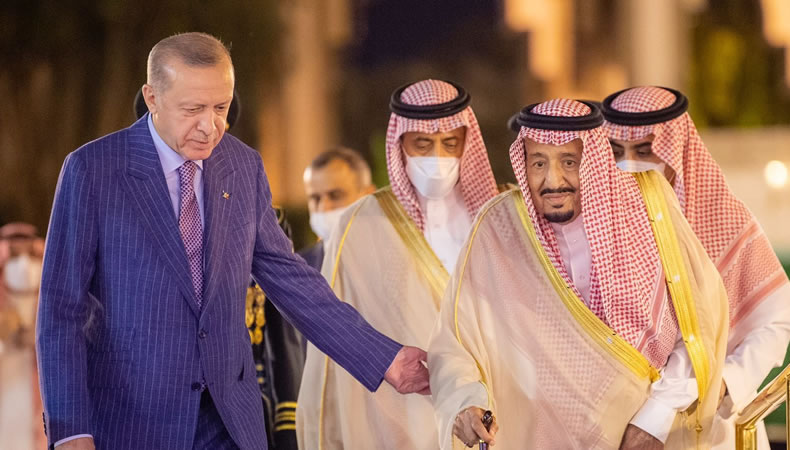President Erdogan’s visit to Saudi Arabia might be a game changer


Since the assassination of US-Saudi critic Jamal Khashoggi at the Saudi consulate in Istanbul in 2018, bilateral relations between Turkey and Saudi Arabia have been on hold. Erdogan never specifically blamed Mohammed bin Salman for the assassination, but he did say it was authorized by “the highest echelons of the Saudi administration.” These allegations are denied by Saudi Arabia.
Following the murder, Turkish officials published audio recordings of the crime, and bilateral relations between Turkey and Saudi Arabia suffered yet another setback. The United States and other western nations have likewise distanced themselves from the oil-rich nation. However, relations between Riyadh and the international community appear to be steadily improving, most notably as a result of the conflict in Ukraine, where Saudi oil is required more than ever.
Related Posts
Saudi Arabia and Turkey
Ankara has done a lot to strengthen relations with the fellow Sunni Muslim country ahead of Erdogan’s visit. For one thing, it toned down its condemnation of Jamal Khashoggi’s assassination. Saudi Arabia’s imports from Turkey, meanwhile, increased by 2.8% in the first two months of 2022. Imports from Turkey fell by 62.3 percent to 3.32 billion riyals ($886 million, €844 million) the previous year. Despite considerable condemnation from rights organizations and Khashoggi’s girlfriend Hatice Cengiz, Turkey relocated the trial of 26 Saudi defendants in connection with the Khashoggi case from Ankara to Riyadh in April.
“A long-term reconciliation with Saudi Arabia has been crucial for Turkey, mostly for economic reasons. Turkey’s political and economic condition is precarious. Saudi Arabia is a significant market for Turkish products, both as a buyer and as a potential investor “Sebastian Sons, a researcher at the CARPO think tank in Germany, told DW.
Saudi Arabia, on the other hand, has a lot on the line. “The visit is very significant for Mohammed bin Salman’s image. The Saudis anticipate that MBS will be revalued as a person, and that the trip would serve as a penitential course for Turkey.” For Riyadh, the trip is seen as bolstering “the Saudi leadership position and MBS’ personal leadership role in the region,” according to Sons.
“This visit is not a regular journey of a head of state,” says Hani Naqshbandi, a political analyst and Saudi journalist: “It is more of a symbolic gesture that will be followed by an increase in trade volume, tourism, and economic links.” He also sees “a commensurate yearning for reconciliation in the area as a whole,” he says.
Saudi Arabia, Turkey, and the Region
Ankara has also been pressing for stronger relations with the United Arab Emirates, Israel, Qatar, and Egypt, according to Professor Samir Salha of Turkey’s Kojali University, who specializes in Turkish and regional problems. Erdogan’s February trip to the United Arab Emirates resulted in a $4.9 billion (€4.6 billion) currency exchange to assist stabilize the Turkish lira, as well as a commitment to set up a $10 million fund to invest in the Turkish economy.
Ankara greeted Israeli President Isaac Herzog cordially in March, and Turkey maintains strong relations with Qatar. Egypt has a close relationship with Turkey, which is regarded to have played a crucial part in the reconciliation between the two countries. “As a result, we have a type of triangular collaboration in terms of business relationships, as well as security objectives in relation to Iran,” Sons told DW. Turkey, Saudi Arabia, the region, and Iran are all on the list.
Saudi Arabia is still fighting a proxy war in Yemen with Iran, and Riyadh may be hoping that Turkey’s long-standing ties with Tehran could help resolve the conflict. “On the one hand, in order to establish a feasible settlement with the Houthis in Yemen, Iran must be handled tactically. Iran, on the other hand, continues to be a shared foe “The explanation came from the sons. Sons told DW that he believes a “anti-Iranian axis with Turkey, Israel, and Egypt is part of Mohammed bin Salman’s foreign policy goal to restore himself and Saudi Arabia’s leadership role in the region.”
Given that Turkey and Saudi Arabia are both Sunni, whereas Iran is Shia, some see closer bilateral ties as indicating a new regional Sunni alliance. Analyst Naqshbandi, on the other hand, believes that new coalitions in the area would be based on Shia Islam rather than Sunni Islam “resolving political conflicts ” Sons agreed that Ankara-Riyadh ties would “continue to be tactical in character.” “There is still a lot of mistrust on both sides, especially on the Saudi side.”

















